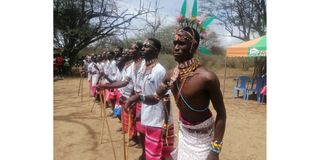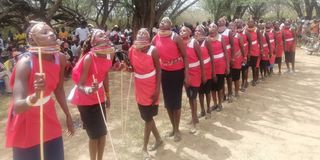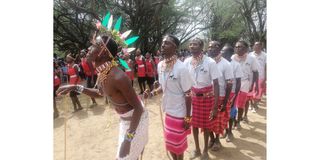Premium
Morans graduate from training meant to keep them off banditry

Pokot and Ilchamus moran's perform a dance during their graduation ceremony in Ruko's conservancy in Tiaty sub-county of Baringo on November,5, 2022
At least 59 morans and young women from banditry-rocked areas of Baringo County got a chance to explore new ways of earning a living after completing training on economic empowerment.
A rare kind of ceremony was witnessed in the Ruko Sanctuary Camping Conservancy in Tangulbey, Tiaty, as communities gathered to witness the graduation of the morans, who had undergone a six-month training programme.
The Ujuzi Manyattani programme is an initiative of a non-governmental organisation called Northern Rangelands Trust, which focuses on empowering communities and environmental conservation, as well as promoting peace.
During the training the beneficiaries, a majority of whom are semi-illiterate, were equipped with various technical skills that would enable them to create alternative income-generating activities.
Mr James Leparkitore, one of the beneficiaries, could not hide his joy after receiving his training certificate in motorcycle repair. He said it was a major milestone in improving his life.
The 24-year-old Ilchamus moran disclosed to the Nation that he was a victim of the banditry scourge. He said he was rendered an orphan at a young age when cattle rustlers invaded his home and took away his family’s herd and killed both his parents.
“Since then I have just been staying idle without any hope in life, until the NRT Trading team arrived and offered the training through their Ujuzi Manyattani initiative. I am happy that I am now able to diagnose and repair motorbikes after going through the training,” Mr Leparkitore said.

Pokot and Ilchamus Moran's perform a dance during their graduation ceremony in Ruko's conservancy in Tiaty subcounty of Baringo on November,1, 2022
He thanked the programme sponsors, saying he plans to open a motorcycle repair garage in the area and train more youths to help him with the repair work.
Another beneficiary, Faith Kimurge, said the training has rescued her from poverty by empowering her with skills to generate income.
Ms Kimurge, who trained in tailoring and dressmaking, revealed that she was married at a tender age and was bored with staying home to look after the children while depending fully on her husband.
“Because our animals starved to death during the drought, we did not have any other form of economic activity,” she said.
“I was always at home waiting for relief food from the government. But now I know I am able to create employment for myself and employ others using the skills that I have acquired.”
She said she plans to join hands with other women for table banking.
Ujuzi Manyattani coordinator Peter Nguno said the training is in line with the NRT mission of improving livelihoods by empowering communities to become self-reliant.
Mr Nguno explained that the programme, which began in 2019, involves partnering with government technical and vocational education and training institutions and conservancies to train the communities in relevant courses that are responsive to the needs of the target community.

Pokot and Ilchamus Moran's perform a dance during their graduation ceremony in Ruko's conservancy in Tiaty sub-county of Baringo
He said the programme covers over five counties, including Garissa, Isiolo, Samburu, Marsabit, Laikipia and West Pokot.
“The programme brings people together and empowers them to run businesses and foster peace among themselves. It is an eye-opener for the communities to learn about alternative ways to earn a living,” Mr Nguno said.
The new graduates raise to more than 600 the number of people who have benefited from the programme, said NRT chief economic programmes officer Ture Boru.
Mr Boru said the programme seeks to equip morans with the skills to earn a living without being involved in cattle rustling.
“The program is an initiative to help the morans and young women escape retrogressive practices by empowering them with skills that will enable them to have alternative sources of income,” Mr Boru said.




